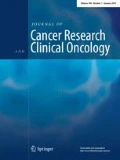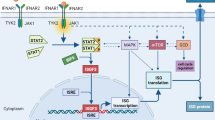Abstract
Purpose
Tumor cells have developed multiple mechanisms to escape immune recognition mediated by T cells. Indoleamine 2,3-dioxygenase (IDO), a tryptophan-catabolizing enzyme inducing immune tolerance, is involved in tumor escape from host immune systems in mice. Astragaloside IV (AS-IV), an extract from a commonly used Chinese medicinal plant Astragalus membranaceus, has been shown to be capable of restoring the impaired T-cell functions in cancer patients. The purpose of this study was to investigate the mechanisms underlying the anticancer properties of AS-IV.
Methods
Here, we used IDO-overexpressed murine Lewis lung carcinoma cells to establish an orthotopic lung cancer model in C57BL/6 mice. Next, tumor growth was evaluated in several different treatment groups: control (saline), AS-IV, paclitaxel, and 1-methyl tryptophan (an inhibitor of IDO). We then analyzed the percentages of various immune cell subsets among the splenic lymphocytes of lung cancer mice by flow cytometry. The level of IDO was measured by real-time PCR and Western blot.
Results
We showed that the growth of tumor was suppressed by AS-IV treatment in vivo. AS-IV also could down-regulate regulatory T cells (Tregs) and up-regulate cytotoxic T lymphocytes (CTLs) in vivo and in vitro. Consistent with its ability to interfere with T-cell immunity, AS-IV blocked IDO induction both in vitro and in vivo.
Conclusions
The results of these studies indicate that AS-IV has in vivo anticancer activity and can enhance the immune response by inhibiting the Tregs frequency and induce the activity of CTLs, which might be related to the inhibition of IDO expression.





Similar content being viewed by others
Abbreviations
- IDO:
-
Indoleamine 2,3-dioxygenase
- AS-IV:
-
Astragaloside IV
- Treg:
-
T regulatory cell
- CTL:
-
Cytotoxic T lymphocyte
- 3LL:
-
Lewis lung carcinoma
- 1-MT:
-
1-Methyl tryptophan
References
Boon T, van der Bruggen P (1996) Human tumor antigens recognized by T lymphocytes. J Exp Med 183:725–729
Chatila TA (2005) Role of regulatory T cells in human diseases. J Allergy Clin Immunol 116:949–959 quiz 60
Chen YH, Kuo ML, Cheng PJ, Hsaio HS, Lee PT, Lin SJ (2012) Regulation of CD28 expression on umbilical cord blood and adult peripheral blood CD8+ T cells by interleukin(IL)-15/IL-21. Cytokine 58(1):40–46
Du X, Zhao B, Li J, Cao X, Diao M, Feng H, Chen X, Chen Z, Zeng X (2012) Astragalus polysaccharides enhance immune responses of HBV DNA vaccination via promoting the dendritic cell maturation and suppressing Treg frequency in mice. Int Immunopharmacol 14(4):463–470
Ercolini AM et al (2005) Recruitment of latent pools of high-avidity CD8(+) T cells to the antitumor immune response. J Exp Med 201:1591–1602
Fallarino F, Grohmann U, Vacca C, Bianchi R, Orabona C, Spreca A et al (2002) T cell apoptosis by tryptophan catabolism. Cell Death Diff 9:1069–1077
Fallarino F, Grohmann U, You S, McGrath BC, Cavener DR, Vacca C et al (2006) The combined effects of tryptophan starvation and tryptophan catabolites down-regulate T cell receptor zeta-chain and induce a regulatory phenotype in naive T cells. J Immunol 176:6752–6761
Friberg M, Jennings R, Alsarraj M, Dessureault S, Cantor A, Extermann M et al (2002) Indoleamine 2,3-dioxygenase contributes to tumor cell evasion of T cell-mediated rejection. Int J Cancer 101:151–155
Godin-Ethier J, Hanafi LA, Duvignaud JB, Leclerc D, Lapointe R (2011) IDO expression by human B lymphocytes in response to T lymphocyte stimuli and TLR engagement is biologically inactive. Mol Immunol 49(1–2):253–259
Huang LF, Yao YM, Li JF, Zhang SW, Li WX, Dong N, Yu Y, Sheng ZY (2012) The effect of Astragaloside IV on immune function of regulatory T cell mediated by high mobility group box 1 protein in vitro. Fitoterapia 83(8):1514–1522
Hwang SL, Chung NP, Chan JK, Lin CL (2005) Indoleamine 2,3-dioxygenase (IDO) is essential for dendritic cell activation and chemotactic responsiveness to chemokines. Cell Res 15(3):167–175
Li X, Wang X, Han C, Wang X, Xing G, Zhou L, Li G, Niu Y (2013a) Astragaloside IV suppresses collagen production of activated HSCs via oxidative stress-mediated p38 MAPK pathway. Free Radic Biol Med 60:168–176
Li X, Wang X, Han C, Wang X, Xing G, Zhou L, Li G, Niu Y (2013b) Astragaloside IV suppresses collagen production of activated HSCs via oxidative stress-mediated p38 MAPK pathway. Free Radic Biol Med 60:168–176
Muller AJ, Scherle PA (2006) Targeting the mechanisms of tumoral immune tolerance with small-molecule inhibitors. Nat Rev Cancer 6:613–625
Munn DH (2006) Indoleamine 2,3-dioxygenase, tumor-induced tolerance and counter-regulation. Curr Opin Immunol 18(2):220–225
Munn DH, Mellor AL (2007) Indoleamine 2,3-dioxygenase and tumor-induced tolerance. J Clin Invest 117:1147–1154
Nguyen H, Weng NP (2010) IL-21 preferentially enhances IL-15-mediated homeostatic proliferation of human CD28+ CD8 memory T cells throughout the adult age span. J Leukoc Biol 87(1):43–49
Nishikawa H et al (2005) Accelerated chemically induced tumor development mediated by CD4+CD25+ regulatory T cells in wild-type hosts. Proc Natl Acad Sci USA 102:9253–9257
Prendergast GC (2008) Immune escape as a fundamental trait of cancer: focus on IDO. Oncogene 27(28):3889–3900
Stone TW, Darlington LG (2002) Endogenous kynurenines as targets for drug discovery and development. Nat Rev Drug Discov 1:609–620
Sun J, Yu J, Li H, Yang L, Wei F, Yu W, Liu J, Ren X (2011) Upregulated expression of indoleamine 2,3-dioxygenase in CHO cells induces apoptosis of competent T cells and increases proportion of Treg cells. J Exp Clin Cancer Res 30:82
Sutmuller RP et al (2001) Synergism of cytotoxic T lymphocyte-associated antigen 4 blockade and depletion of CD25+ regulatory T cells in antitumor therapy reveals alternative pathways for suppression of autoreactive cytotoxic T lymphocyte responses. J Exp Med 194:823–832
Uyttenhove C, Pilotte L, Theate I, Stroobant V, Colau D, Parmentier N et al (2003) Evidence for a tumoral immune resistance mechanism based on tryptophan degradation by indoleamine 2,3-dioxygenase. Nat Med 9:1269–1274
Wu X, Peng M, Huang B, Zhang H, Wang H, Huang B, Xue Z, Zhang L, Da Y, Yang D, Yao Z, Zhang R (2013) Immune microenvironment profiles of tumor immune equilibrium and immune escape states of mouse sarcoma. Cancer Lett 340(1):124–133
Yang Y, Huang CT, Huang X, Pardoll DM (2004) Persistent Toll-like receptor signals are required for reversal of regulatory T cell-mediated CD8 tolerance. Nat Immunol 5:508–515
Yigit R, Massuger LF, Figdor CG, Torensma R (2010) Ovarian cancer creates a suppressive microenvironment to escape immune elimination. Gynecol Oncol 117(2):366–372
Yoshida N, Ino K, Ishida Y, Kajiyama H, Yamamoto E, Shibata K, Terauchi M, Nawa A, Akimoto H, Takikawa O, Isobe K, Kikkawa F (2008) Overexpression of indoleamine 2,3-dioxygenase in human endometrial carcinoma cells induces rapid tumor growth in a mouse xenograft model. Clin Cancer Res 14(22):7251–7259
Yu P et al (2005) Intratumor depletion of CD4+ cells unmasks tumor immunogenicity leading to the rejection of late-stage tumors. J Exp Med 201:779–791
Zheng X, Koropatnick J, Li M, Zhang X, Ling F, Ren X, Hao X, Sun H, Vladau C, Franek JA, Feng B, Urquhart BL, Zhong R, Freeman DJ, Garcia B, Min WP (2006) Reinstalling antitumor immunity by inhibiting tumor-derived immunosuppressive molecule IDO through RNA interference. J Immunol 177(8):5639–5646
Acknowledgments
This work was supported by the National Natural Science Foundation of China (NSFC project number: 81173224), Shanghai Committee of Science and Technology (no. 13140902300), the Shanghai Committee of Science and Technology (grant 11DZ2260600), and the Fundamental Research Funds for the Central Universities.
Conflict of interest
The authors declare that they have no conflict of interest.
Author information
Authors and Affiliations
Corresponding authors
Rights and permissions
About this article
Cite this article
Zhang, A., Zheng, Y., Que, Z. et al. Astragaloside IV inhibits progression of lung cancer by mediating immune function of Tregs and CTLs by interfering with IDO. J Cancer Res Clin Oncol 140, 1883–1890 (2014). https://doi.org/10.1007/s00432-014-1744-x
Received:
Accepted:
Published:
Issue Date:
DOI: https://doi.org/10.1007/s00432-014-1744-x




